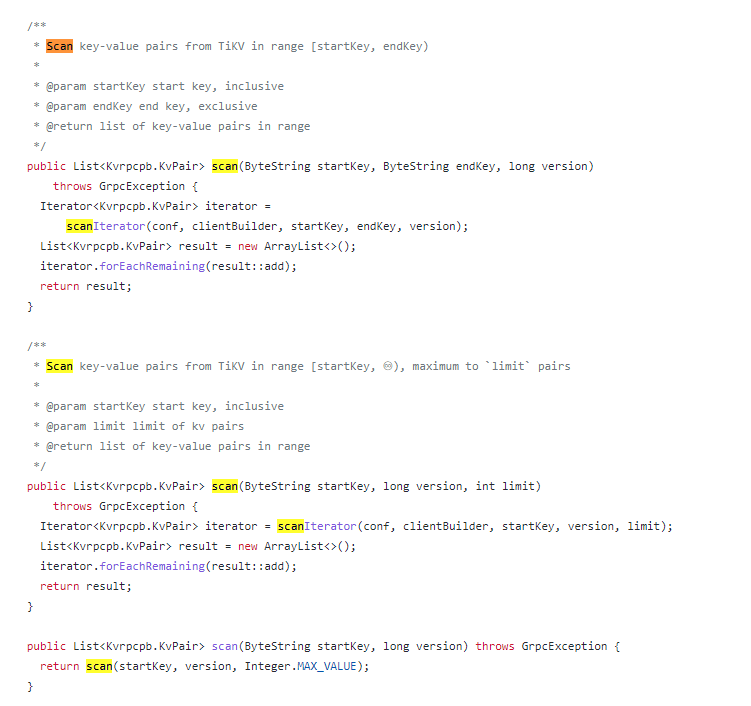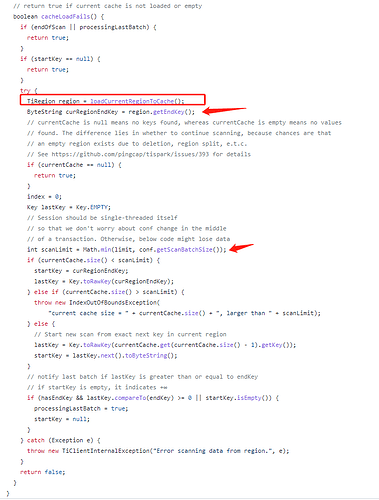Note:
This topic has been translated from a Chinese forum by GPT and might contain errors.Original topic: JavaClient KvClient scan
No matter how you use the method public List<KvPair> scan(ByteString startKey, long version, int limit), it will always throw an error:
org.tikv.common.exception.TiClientInternalException: Error scanning data from region.
at org.tikv.common.operation.iterator.ScanIterator.cacheLoadFails(ScanIterator.java:113)
at org.tikv.common.operation.iterator.ConcreteScanIterator.hasNext(ConcreteScanIterator.java:106)
at java.util.Iterator.forEachRemaining(Iterator.java:115)
at org.tikv.txn.KVClient.scan(KVClient.java:134)
at fs.server.tikv.TikvScanTest.testTIKVTxn3(TikvScanTest.java:313)
at sun.reflect.NativeMethodAccessorImpl.invoke0(Native Method)
at sun.reflect.NativeMethodAccessorImpl.invoke(NativeMethodAccessorImpl.java:62)
at sun.reflect.DelegatingMethodAccessorImpl.invoke(DelegatingMethodAccessorImpl.java:43)
at java.lang.reflect.Method.invoke(Method.java:498)
at org.junit.runners.model.FrameworkMethod$1.runReflectiveCall(FrameworkMethod.java:50)
at org.junit.internal.runners.model.ReflectiveCallable.run(ReflectiveCallable.java:12)
at org.junit.runners.model.FrameworkMethod.invokeExplosively(FrameworkMethod.java:47)
at org.junit.internal.runners.statements.InvokeMethod.evaluate(InvokeMethod.java:17)
at org.junit.runners.ParentRunner.runLeaf(ParentRunner.java:325)
at org.junit.runners.BlockJUnit4ClassRunner.runChild(BlockJUnit4ClassRunner.java:78)
at org.junit.runners.BlockJUnit4ClassRunner.runChild(BlockJUnit4ClassRunner.java:57)
at org.junit.runners.ParentRunner$3.run(ParentRunner.java:290)
at org.junit.runners.ParentRunner$1.schedule(ParentRunner.java:71)
at org.junit.runners.ParentRunner.runChildren(ParentRunner.java:288)
at org.junit.runners.ParentRunner.access$000(ParentRunner.java:58)
at org.junit.runners.ParentRunner$2.evaluate(ParentRunner.java:268)
at org.junit.runners.ParentRunner.run(ParentRunner.java:363)
at org.junit.runner.JUnitCore.run(JUnitCore.java:137)
at com.intellij.junit4.JUnit4IdeaTestRunner.startRunnerWithArgs(JUnit4IdeaTestRunner.java:69)
at com.intellij.rt.junit.IdeaTestRunner$Repeater$1.execute(IdeaTestRunner.java:38)
at com.intellij.rt.execution.junit.TestsRepeater.repeat(TestsRepeater.java:11)
at com.intellij.rt.junit.IdeaTestRunner$Repeater.startRunnerWithArgs(IdeaTestRunner.java:35)
at com.intellij.rt.junit.JUnitStarter.prepareStreamsAndStart(JUnitStarter.java:235)
at com.intellij.rt.junit.JUnitStarter.main(JUnitStarter.java:54)
Caused by: java.lang.IndexOutOfBoundsException: current cache size = 4, larger than 2
at org.tikv.common.operation.iterator.ScanIterator.cacheLoadFails(ScanIterator.java:100)
... 28 more

